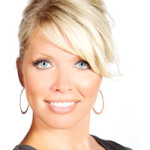- Finding Unshakable Power in a World That Wants to Pull Us ApartPosted 6 months ago
- What could a Donald Trump presidency mean for abortion rights?Posted 6 months ago
- Financial Empowerment: The Game-Changer for Women in Relationships and BeyondPosted 7 months ago
- Mental Health and Wellbeing Tips During and After PregnancyPosted 7 months ago
- Fall Renewal: Step outside your Comfort Zone & Experience Vibrant ChangePosted 7 months ago
- Women Entrepreneurs Need Support SystemsPosted 7 months ago
Healthy Boundaries Create Healthy Relationships

by Crystal Andrus.
After writing last week’s article on “rejection”, I received a few private messages from women asking if I would write more about “boundaries.”
In that blog, I explained that boundary setting is hands-down the most important lesson we women need to learn:
“Healthy boundaries are like having a front door with a lock on it.
You have the right to keep out unpleasant visitors.”
Boundary setting was certainly my most important lesson to learn in order to become empowered, because without healthy boundaries I created unhealthy, dysfunctional relationships . . . and I didn’t even realize I was doing it!
As someone who has tended to over-give, over-do, over-protect, even over-try, I have to remind myself when I begin taking on more than I feel comfortable with — whether it be helping a friend, counseling a family member through a rough time, or offering to “pick up the slack” for someone who has “bitten off more than they can chew” – to back up, slow down, and really ask myself:
“Do I want to be doing this?”
“Is this improving my life or exhausting me?”
“Has this started to become a co-dependent relationship with me as the ‘mother / caretaker’ and them as my ‘child / responsibility’?”
By being aware of how I feel (i.e. drained, frustrated, even resentful), I’ve learned how to catch myself from stepping into chaos, drama, and dysfunction much sooner than I used to.
As a coach (and this goes for most therapists, healers, nurses, counselors, etc.), we have a natural tendency to want to “fix things”, but without learning healthy boundary setting, we can too easily take on the weight of the world and inevitably, hurt the very person we wanted to help because we are giving more than we can afford to lose and eventually, we burnout, become angry, or breakdown. We’re no good to anyone.
Not to mention, I can almost see my weight rising when I’m forgetting to set a boundary. Doesn’t matter how many jogs I take, broccoli I eat, or protein shakes I drink, the weight predictably comes on. I literally carry the weight of my unhealthy boundaries on my body.
Many of us didn’t witness healthy boundaries growing up, whether it was our mother who allowed others to disrespect, use, or abuse her, including us — her child (his is called “porous boundaries”); or our father who was so strict he was like a brick wall (“rigid boundaries”). Either way, we didn’t learn what “healthy” looks like.
On the other hand, we could have had wonderful parents and yet someone else in our life—a teacher, grandparent, uncle, family friend, cousin, brother, whoever—stepped across our personal boundary field and physically, verbally, emotionally, or sexually abused us.
When abuse happens, we lose the ability to realize we have the power to say “no”. This feeling of being unable to protect ourselves can follow us throughout our lives and before we know it, we find ourselves in situations, both big and small, that confront us with our lack of confidence, personal power, and low self-worth.
In fact, I was just speaking to a beautiful, smart, talented woman who told me she was experiencing so much anxiety because her boss had been getting too close physically and would say inappropriate sexual things to her. She wasn’t doing anything flirtatious to provoke him, and couldn’t understand why he was acting this way.
I asked her why she didn’t tell him to back off and her response was that she “didn’t want to hurt his feelings or make things worse by putting her foot down”.
In other words, she was a “people pleaser”.
She hated how she felt around him but didn’t know how to establish a healthy boundary.
As we looked back at her life, she saw a strong pattern of many men being inappropriate with her and her feeling powerless (even as a teenage girl with boys). It was almost as though she believed, “It’s a man’s world and that’s just the way it is. I have no choice.”
Rather than staying focused on the problem, I asked her what she wanted to feel instead.
What are your intentions? I asked her. “What do you want? What would courage have you do?”
* * *
The first step in setting healthy boundaries is for us to be able to identify our own needs, wants, opinions, and rights:
– “Does this feel good to me or does this feel like I’m being manipulated for someone’s gain?”
Once we know how we feel about a situation, we must respect ourselves, and our needs. We teach people how to treat us by the way we treat ourselves—by what we’re willing to accept.
We must all learn to clearly identify what it is we want in our relationships (how we want to feel about ourselves), and then become skilled at assertively expressing ourselves: “When you _______ (fill in the unhealthy behavior), it makes me feel _________. If you can’t be more respectful to me, I will have to _________ (list the consequences and stick to them).”
This process allows our “Woman Energy” to emerge.
Here are some more tips for setting healthy boundaries, modified from the book, Boundaries: Where You End and I Begin, by Anne Katherine:
– When you feel angry or resentful, you probably need to set a boundary. Listen to yourself then communicate your boundary assertively.
– When you identify the need to set a boundary, be clear, preferably without anger, and in as few words as possible. And most importantly, be confident about your needs and feelings surrounding this situation.
– Do not justify, apologize for, or rationalize the boundary you are setting. Do not argue! Just set the boundary calmly, firmly, clearly, and respectfully.
– You can’t set a boundary and take care of someone’s feelings at the same time. You are not responsible for the other person’s reaction to the boundary you are setting.
– At first, you will probably feel selfish, guilty, or embarrassed when you set a boundary but you can’t establish a clear boundary successfully if you send a mixed message by apologizing afterward.
– When you set boundaries, you might be tested (especially by those accustomed to controlling you, abusing you, or manipulating you). Stay strong.
– Eliminate toxic people from your life. It may feel mean or unkind but your health depends on the quality of the relationships you have. Bad attention is not better than no attention at all. Don’t play with bullies — even if they’re family members. Showing them that you won’t allow them in your life if they want to create problems for you, will help them too become better people.
Learning to set healthy boundaries takes time. It is a process. After awhile, it will be second nature. In fact, people will “feel” your confident assertiveness, and soon you will rarely be “tested”. It’s just an energy you give off: Woman Energy! BAM!
I’d love to know how you feel about today’s blog. Please leave me a comment and I’ll get back to you!
Warmly,
Crystal
 Crystal Andrus is a leader in the field of self-discovery and personal transformation. From a very tough beginning—one that could easily have spun her into darkness, Crystal has risen to become an international coaching sensation and the Founder of The S.W.A.T. Institute (Simply Woman Accredited Trainer)- the world’s #1 on-line Personal Empowerment Coaching Certification School for women. She’s three-time best-selling Hay House author, the host of “The Crystal Andrus Show” and “Empowerment Class” on CBS Radio, a widely-sought after motivational speaker and a world-renowned women’s advocate. www.crystalandrus.com
Crystal Andrus is a leader in the field of self-discovery and personal transformation. From a very tough beginning—one that could easily have spun her into darkness, Crystal has risen to become an international coaching sensation and the Founder of The S.W.A.T. Institute (Simply Woman Accredited Trainer)- the world’s #1 on-line Personal Empowerment Coaching Certification School for women. She’s three-time best-selling Hay House author, the host of “The Crystal Andrus Show” and “Empowerment Class” on CBS Radio, a widely-sought after motivational speaker and a world-renowned women’s advocate. www.crystalandrus.com






